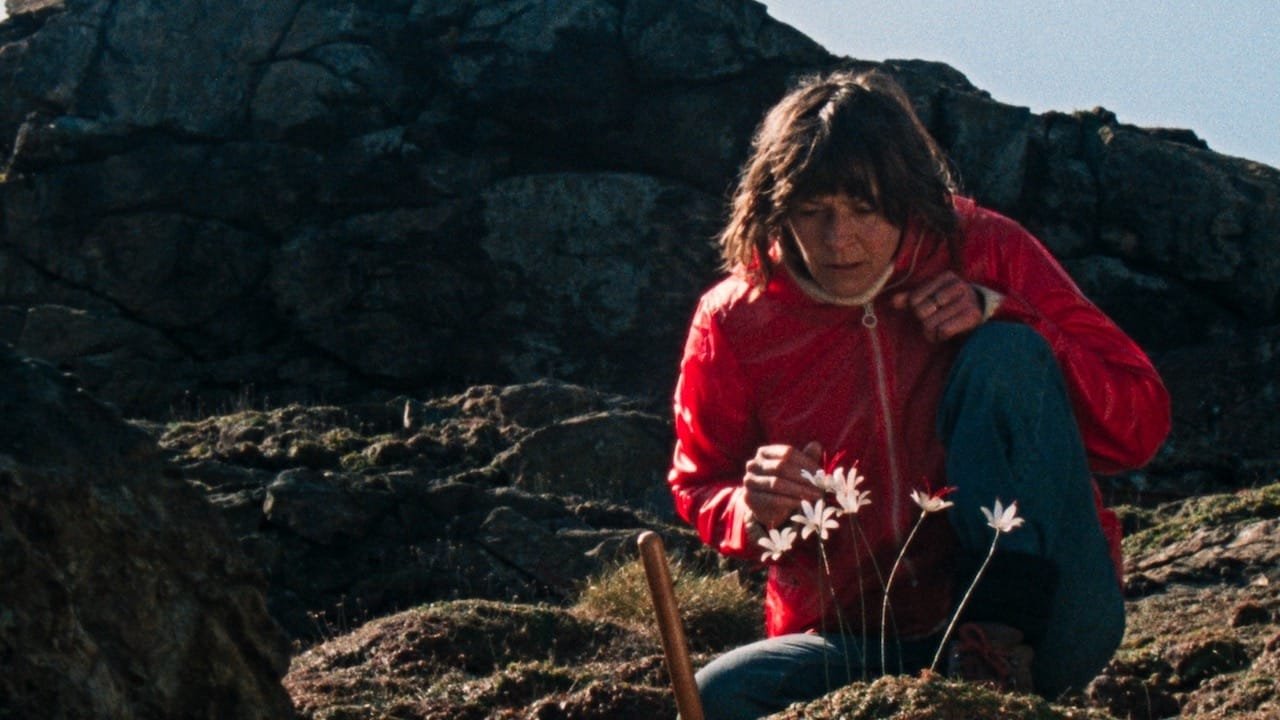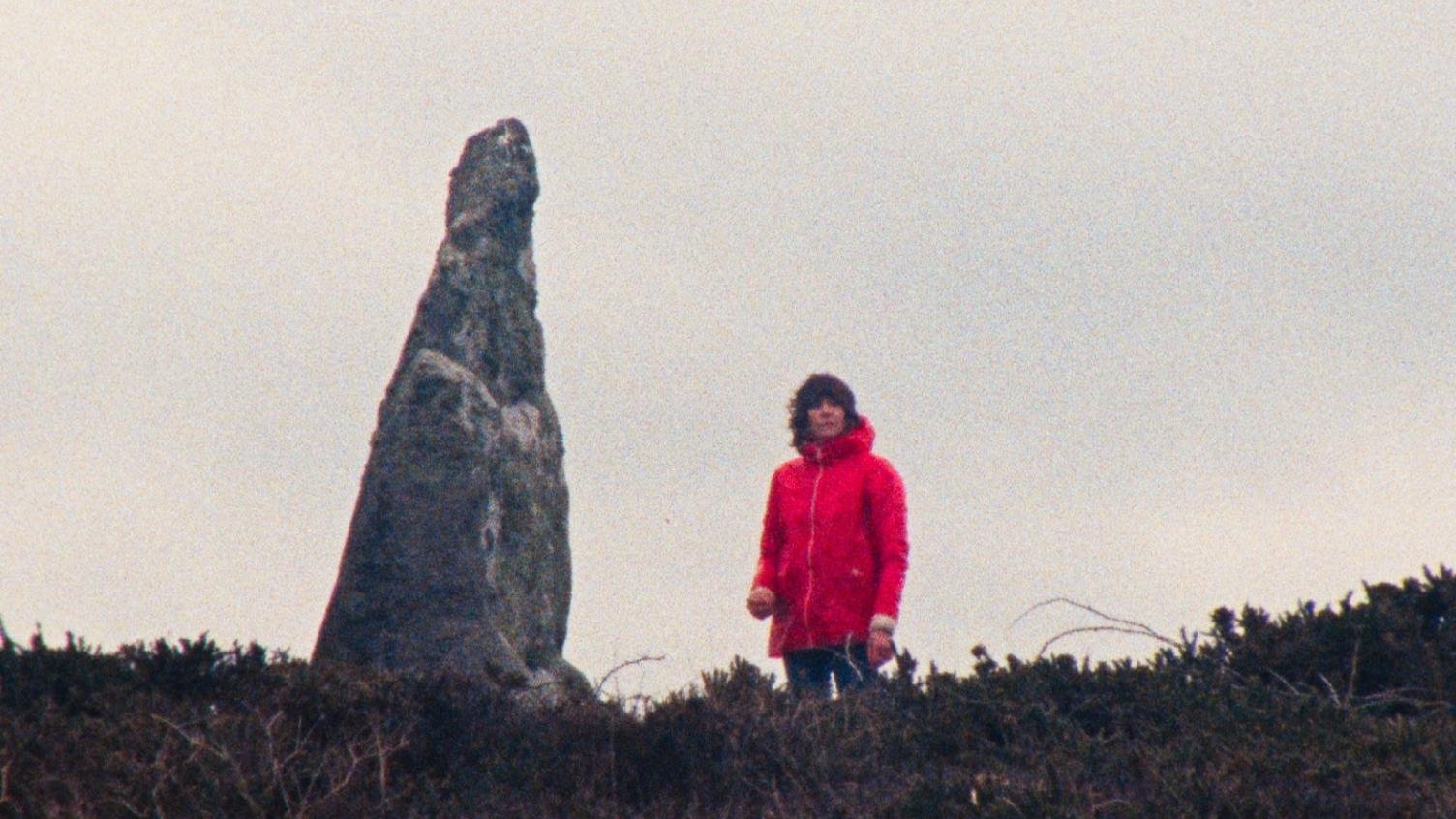[Editorial] The Stone Swallows You Whole: Reconciling A Self Through Enys Men [2022]

It was about halfway through my inaugural viewing of Mark Jenkin’s Enys Men that I burst into tears for the first time. In a movie that is mostly dialogue free, every word feels heavy with meaning. Even more so when one of the words reverberating through the cinema speakers is the name of the hometown you spent years trying to forget.
For years, I felt ashamed of my Cornish heritage, outrunning the county where I was born and raised. As soon as I could, I moved oceans away from the land where, as far back as the 15th century, my ancestors worked as fishermen, risking - and often losing - their lives to make a living in one of the most dangerous yet necessary trades of the time. When I met new people who asked where I was from, I groaned almost apologetically, the word Cornwall swilling in my mouth like a foul taste, as if admitting my heritage would immediately transform their image of me into a barefoot bumpkin.
I wished so badly that I lived in the places I saw in the films I devoured as escapism, the gritty cool of the streets of London, or the sun-drenched hillsides of Los Angeles. And can you blame me? Cornwall has hardly been represented fairly in film - if at all. Think of the raping inbreds of Sam Peckinpah's Straw Dogs, or the suspicious and stupid villagers in Hammer’s The Plague of the Zombies. It is a representation not too dissimilar to the American South in the slashers of the ‘70s and then again in the sallow and sadistic '00s torture-porn days - freakish and foul, a place to be avoided until civilized by good old-fashioned Englishness.
LISTEN TO OUR HORROR PODCAST!
![[Ghouls Podcast] Maniac (2012) with Zoë Rose Smith and Iona Smith](https://images.squarespace-cdn.com/content/v1/5fe76a518d20536a3fbd7246/1696356006789-NYTG9N3IXCW9ZTIJPLX2/maniac.jpg)
For a good portion of British history, Cornwall retained the markers of a separate country, and until the 1700s, the Cornish were considered to be a different race entirely, with their own language, traditions and culture. Even now, Cornwall has retained its own distinctive identity, with some choosing to continue the fight to be recognised as an independent state. Legally however, the county remains part of England, and as a result is often left out of the conversation on regional horror and folklore throughout Britain and Ireland. Cornwall's Celtic cousins of Wales and Scotland have all firmly established their unique and exciting places in the cinematic conversation, and the recent boom of atmospheric features coming from Ireland (You Are Not My Mother, Caveat, The Hole in the Ground) proves that audiences are keen to explore the intricacies of regional folk horror. Enter Enys Men, a surreal tale of isolation and madness on the Cornish coast.
Enys Men - meaning ‘stone island’ in its native Cornish - follows a woman (played with unsettling serenity by the talented Mary Woodvine) known only as The Volunteer tasked with cataloging her daily observations of nature on an uninhabited island. As a series of memories morph into spectral hallucinations, The Volunteer starts to lose her grip on reality, and the audience is left questioning just what – if anything – is really happening.
It’s a disservice (and possibly fundamentally incorrect) to view Enys Men as separate from its setting. Between the looming tower of a crumbling tin mine to the lichen-sprouting flower nestled among thick gorse, the salt and stone of Cornwall is as much a character as The Volunteer, playing at once protagonist, antagonist, and neutral, God-like observer. The stable, hypnotic rise and fall of the tide rushing in to fill craggy cracks and crevices mimics the repetition and ritual that form the core of Enys Men and define it as unmistakably Cornish. Tide comes in. Tide goes out. Wake up. Tea in tin cup. Power up the generator. Same jeans. Observations. No change. No change. No change.

Anyone familiar with the county, especially those who exist on its more isolated stretches, will know this sense of stasis all too well. While Enys Men is canonically set in the 1970s, you'd be forgiven for struggling to place it in any modern era. Time tends to stand still in Cornwall, reflected in the repeated motif of lichen that grows on stone, flowers and eventually The Volunteer’s body. Many of the county’s small villages and towns remain suspended as snapshots of a time long passed. Public transport is few and far between. Chain stores and restaurants are hard to come by. Even your Wi-fi signal will be weakened by the abundance of radiating granite just below the surface. Enys Men has captured the liminal uncertainty of a land with a lost history, unable to move forward and at once drifting aimlessly, unanchored from its proud past.
LISTEN TO OUR HORROR PODCAST!
Throughout the film, The Volunteer is plagued by visions of said past, haunted by stomping Bal Maidens and fishermen, both corporeal representations of Cornwall’s rich histories all but erased by industrialization, late-stage capitalism and the slathering greed of second homeowners. Then there’s the miners, who dwell deep underground as the ghosts of Cornwall’s buried past, eventually making their way into the Volunteer’s home, refusing to be lost to the darkness of time and memory. The Volunteer too finds out that suppression of memory can only last for so long; eventually the tide will bring all manner of truths to the shore.
As the dreamy folk beat of Gwenno’s Cornish-language song ‘Kan Me’ plays the film out, I found myself in tears once again at hearing the dead language of my ancestors resurrected with melody and sweetness. Enys Men helped me reconcile an internal conflict, to embrace a history of myself that I had long smothered with shame. With this eerie, idyllic film, Mark Jenkin has captured the sadness and beauty of my home, the place that I had to leave in order to love.
Because, as Enys Men’s ending tells us in no uncertain terms, if you stand for too long on Cornwall’s stone, it will swallow you whole.

![[Ghouls Podcast] Ghouls Watch: Bucket List of the Dead, Blood Drive, Candy Land & more](https://images.squarespace-cdn.com/content/v1/5fe76a518d20536a3fbd7246/1696261000263-58VQFOVWPE363OFGP7RF/GHOULS+WATCH.jpg)
![[Ghouls Podcast] Tender Is The Flesh with Zoë Rose Smith, Bel Morrigan and Liz Bishop](https://images.squarespace-cdn.com/content/v1/5fe76a518d20536a3fbd7246/1693769261264-MS4TS4Z4QC1N15IXB4FU/Copy+of+%5BJuly%5D+Antiviral%2C+possesoor+and+infinity+pool.jpg)
![[Ghouls Podcast] Antiviral, Possessor & Infinity Pool with Zoë Rose Smith, Amber T and Iona Smith](https://images.squarespace-cdn.com/content/v1/5fe76a518d20536a3fbd7246/1691238787263-XYRKXW2Z7RWI9AY2V2GX/%5BJuly%5D+Antiviral%2C+possesoor+and+infinity+pool+%281%29.jpg)
![[Ghouls Podcast] Ghouls Watch: Body Horror Recommendations](https://images.squarespace-cdn.com/content/v1/5fe76a518d20536a3fbd7246/1691238687847-L9U434I1U4HZ3QMUI3ZP/%5BJuly%5D+Ghouls+Watch+-+Website+%281%29.jpg)
![[Ghouls Podcast] The Last House on the Left (2009) with Zoë Rose Smith and Jerry Sampson](https://images.squarespace-cdn.com/content/v1/5fe76a518d20536a3fbd7246/1687863043713-54DU6B9RC44T2JTAHCBZ/last+house+on+the+left.jpg)
![[Ghouls Podcast] Ghouls Watch: Bones and All, Suitable Flesh, The Human Centipede & more](https://images.squarespace-cdn.com/content/v1/5fe76a518d20536a3fbd7246/1687855203348-7R2KUSNR6TORG2DKR0JF/%5BJune%5D+Ghouls+Watch+-+Website.jpg)
![[Ghouls Podcast] 3 Original vs. Remake Horror Films with Rebecca McCallum & Kim Morrison](https://images.squarespace-cdn.com/content/v1/5fe76a518d20536a3fbd7246/1685286663069-0Q5RTYJRNWJ3XKS8HXLR/%5BJune%5D+Original+vs.+Remake+Horror+Films.png)
![[Ghouls Podcast] Ghouls Watch: The Devil’s Candy, Morgana, Dead Ringers & more](https://images.squarespace-cdn.com/content/v1/5fe76a518d20536a3fbd7246/1685284429090-5XOOBIOI8S4K6LP5U4EM/%5BMay%5D+Ghouls+Watch+-+Website.png)
![[Ghouls Podcast] The Bay (2012) with Ariel Powers-Schaub & Amber T](https://images.squarespace-cdn.com/content/v1/5fe76a518d20536a3fbd7246/1684751617262-6K18IE7AO805SFPV0MFZ/The+Bay+website+image.jpg)
![[Ghouls Podcast] The Ruins (2008) with Ash Millman & Zoë Rose Smith](https://images.squarespace-cdn.com/content/v1/5fe76a518d20536a3fbd7246/1684076097566-BE25ZBBECZ7Q2P7R4JT4/The+Ruins.jpg)
![[Ghouls Podcast] Picnic at Hanging Rock (1975) with Zoë Rose Smith & Rebecca McCallum](https://images.squarespace-cdn.com/content/v1/5fe76a518d20536a3fbd7246/1682536446302-I2Y5IP19GUBXGWY0T85V/picnic+at+hanging+rock.jpg)
![[Ghouls Podcast] Ghouls Watch: Deathproof, Child’s Play, Ghostwatch & more](https://images.squarespace-cdn.com/content/v1/5fe76a518d20536a3fbd7246/1682447065521-DWF4ZNYTSU4NUVL85ZR0/ghouls+watch.png)
![[Ghouls Podcast] 5 Coming-of-Age Horror Film Recommendations](https://images.squarespace-cdn.com/content/v1/5fe76a518d20536a3fbd7246/1681418402835-EMZ93U7CR3BE2AQ1DVH4/S2+EP5.png)
![[Ghouls Podcast] Psychotic Women in Horror with Zoë Rose Smith & Mary Wild](https://images.squarespace-cdn.com/content/v1/5fe76a518d20536a3fbd7246/1678635495097-X9TXM86VQDWCQXCP9E2L/Copy+of+Copy+of+Copy+of+GHOULS+PODCAST+THE+LOVED+ONES.jpg)
![[Ghouls Podcast] Good For Her Horror Film Recommendations](https://images.squarespace-cdn.com/content/v1/5fe76a518d20536a3fbd7246/1678634497037-W441LL37NW0092IYI57D/Copy+of+Copy+of+GHOULS+PODCAST+THE+LOVED+ONES.jpg)
![[Ghouls Podcast] Ghouls Watch: Severance, Run Sweetheart Run, Splice & more](https://images.squarespace-cdn.com/content/v1/5fe76a518d20536a3fbd7246/1677589685406-YZ9GERUDIE9VZ96FOF10/Copy+of+GHOULS+PODCAST+THE+LOVED+ONES+%281%29.jpg)
![[Ghouls Podcast] Nekromantik with Zoë Rose Smith & Rebecca McCallum](https://images.squarespace-cdn.com/content/v1/5fe76a518d20536a3fbd7246/1677422649033-Z4HHPKPLUPIDO38MQELK/feb+member+podcast.jpg)
![[Ghouls Podcast] The Loved Ones (2009) with Liz Bishop](https://images.squarespace-cdn.com/content/v1/5fe76a518d20536a3fbd7246/1676369735666-56HEK7SVX9L2OTMT3H3E/GHOULS+PODCAST+THE+LOVED+ONES.jpg)
![[Ghouls Podcast] Terrifier (2016) & Terrifier 2 (2022) with Janine Pipe](https://images.squarespace-cdn.com/content/v1/5fe76a518d20536a3fbd7246/1674478017541-0DHH2T9H3MVCAMRBW1O1/_PODCAST+NO+IMAGE+2023+EP+4+%282%29.jpg)
![[Ghouls Podcast] Final Destination 5 & Wrap-up with Ariel Powers-Schaub & Iona Smith](https://images.squarespace-cdn.com/content/v1/5fe76a518d20536a3fbd7246/1672841326335-WER2JXX7WP6PO8JM9WB2/PODCAST+BONUS+2023+%284%29.jpg)
![[Ghouls Podcast] Final Destination 3 & 4 with Ariel Powers-Schaub & Iona Smith](https://images.squarespace-cdn.com/content/v1/5fe76a518d20536a3fbd7246/1672841151148-U152EBCTCOP4MP9VNE70/PODCAST+BONUS+2023+%283%29.jpg)
![[Ghouls Podcast] Krampus (2015) with Megan Kenny & Rebecca McCallum](https://images.squarespace-cdn.com/content/v1/5fe76a518d20536a3fbd7246/1672839790368-VYX6LIWC5NVVO8B4CINW/_PODCAST+NO+IMAGE+2023+EP+17.jpg)
![[Ghouls Podcast] Soho Horror Film Review with Hannah Ogilvie & Caitlyn Downs](https://images.squarespace-cdn.com/content/v1/5fe76a518d20536a3fbd7246/1672840392291-XQGQ94ZN9PTC4PK9DTN1/_PODCAST+NO+IMAGE+2023+EP+16.jpg)
![[Ghouls Podcast] Final Destination 1 & 2 with Ariel Powers-Schaub & Iona Smith](https://images.squarespace-cdn.com/content/v1/5fe76a518d20536a3fbd7246/1672841181605-5JOOW88EDHGQUXSRHVEF/PODCAST+BONUS+2023+%282%29.jpg)
![[Ghouls Podcast] The Borderlands (2013) with Jen Handorf](https://images.squarespace-cdn.com/content/v1/5fe76a518d20536a3fbd7246/1672839985316-KPLOVA9NGQDAS8Z6EIM9/_PODCAST+NO+IMAGE+2023+EP+15.jpg)
![[Ghouls Podcast] Soho Horror Film Preview with Hannah Ogilvie & Caitlyn Downs](https://images.squarespace-cdn.com/content/v1/5fe76a518d20536a3fbd7246/1672840411619-IP54V5099H6QU9FG4HJP/_PODCAST+NO+IMAGE+2023+EP+14.jpg)
![[Ghouls Podcast] Halloween Special: 5 Horror Films to Watch This Halloween with Joshua Tonks and Liz Bishop](https://images.squarespace-cdn.com/content/v1/5fe76a518d20536a3fbd7246/1672840351086-2AWFIS211HR6GUY0IB7I/_PODCAST+NO+IMAGE+2023+EP+13.jpg)













![[Ghouls Podcast] Horror Literature with Nina Book Slayer & Alex Bookubus](https://images.squarespace-cdn.com/content/v1/5fe76a518d20536a3fbd7246/1672840273346-ASHBRDHOKRHMGRM9B5TF/_PODCAST+NO+IMAGE+2023+EP+12.jpg)
![[Ghouls Podcast] Alien with Tim Coleman and Rebecca McCallum](https://images.squarespace-cdn.com/content/v1/5fe76a518d20536a3fbd7246/1672839878802-LR40C39YGO3Q69UCCM62/_PODCAST+NO+IMAGE+2023+EP+11.jpg)
![[Editorial] Oscar Nominations 2026: Where to stream all the horror picks](https://images.squarespace-cdn.com/content/v1/5fe76a518d20536a3fbd7246/1769113319180-4INRRNMZK4DZLHRSUXX5/rev-1-GRC-TT-0026r_High_Res_JPEG-1024x372.jpeg)
![[Editorial] Soho Horror Film Festival: Interview with Aimee Kuge on Cannibal Mukbang](https://images.squarespace-cdn.com/content/v1/5fe76a518d20536a3fbd7246/1701808004722-9M8SZ2UXY52QBQBR4NTI/img20230818_15150780.JPG)
![[Editorial] 10 Films & Events to Catch at Soho Horror Film Fest 2023](https://images.squarespace-cdn.com/content/v1/5fe76a518d20536a3fbd7246/1700819417135-299R7L4P0B676AD3RO1X/Screenshot+2023-11-24+at+09.41.52.png)
![[Editorial] 9 Horror Nintendo Switch Games To Play](https://images.squarespace-cdn.com/content/v1/5fe76a518d20536a3fbd7246/1697214470057-3XZXX8N4LYIMDFWS6Z3P/Screenshot+2023-10-13+at+17.20.13.png)
![[Mother of Fears] Mothering in Silence in A Quiet Place (2018)](https://images.squarespace-cdn.com/content/v1/5fe76a518d20536a3fbd7246/1696445921315-HZJ2DZYQIH6VVWXBO2YL/Screenshot+2023-10-04+at+19.52.29.png)
![[Event Review] Highlights from Mayhem Film Festival 2023](https://images.squarespace-cdn.com/content/v1/5fe76a518d20536a3fbd7246/1697624582491-MPT2VB9RRGU6OG7L6UKL/Mayhem+2023.jpg)
